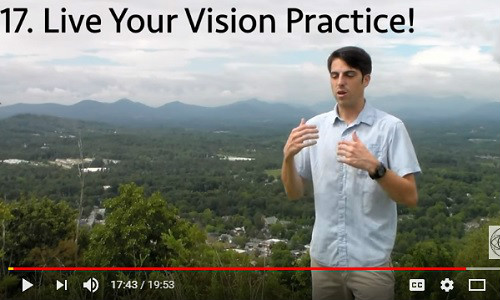The secret to achieving anything is to work at it consistently. That’s absolutely true when it comes to improving your vision.
You can make big mistakes with vision improvement that result in wasted time, and worse, you getting frustrated and giving up.
Do yourself a favor and follow the instructions of someone who has been there and knows what he’s talking about. I hope you’re liking some of my own videos too (I’ll have 2 more soon!), but another thing I like to do is acknowledge other people who are doing great work to help people with this process.
See Nathan’s top video on Youtube below, the routine he recommends as you wake up in the morning. This will get you started, or it will get you on track if you’ve been floundering around with this.
Try it out!
If you find this helpful, Nathan runs a very good online course, the Holistic Vision Program.
I happen to know exactly what you get in the course, because I spent hours going through almost the whole thing myself to see if I wanted to help him promote it. Some videos I sat and watched. Some I listened to while frying bacon. Some I went to bed listening to, like I’ve done with meditation tracks, and I had to try to find where I left off in the morning so I didn’t miss good stuff (of which there is plenty). Honestly, my attention span is nothing to be desired.
Obviously, you want to sit down and paying more close attention to the material than I did. While I don’t actually need it for myself, I’m guessing you do.
Here are some of my favorite topics that you will learn more about in-depth…
— The aspects of good vision, and how to practice them. Good vision is more than acuity (reading the eye chart). It’s depth perception, color perception, tracking, and more.
— Why “No pain, no gain” is counterproductive with vision. I lift weights regularly and have been in the fitness industry for 11 years. I can tell you that improving your vision requires a totally different mentality and approach.
— The 3 Tenets of Neuroplasticity that will help you improve your vision. Science is on your side.
— How to determine what initially caused your vision problem. With this knowledge you can escape the past and move forward with no mental blocks preventing your progress.
– What to ask yourself about your current state of mind while you practice. A mental or emotional state incongruent with your desire to see will prevent your progress.
– The 3 R’s of Vision Training. You can guess one: relaxation. The others are usually neglected when you’re learning the Bates method.
– The difference between centralization and staring. This is key! You will learn how to pay close attention to details without locking your eyes in place.
Also, you get a valuable 1-hour private session with him at the end of the course to fine-tune a program that’s just right for you, so you can keep progressing.
He has a lot of experience in helping people do this. You are not likely to succeed on your own without personal one-one-one help. The private session accomplishes this.
There’s a reason he does it this way. Getting a private session like that at the end, after the course material, is the best way to get the most out of the whole experience. You are able to ask him educated questions to fill in any gaps in your understanding. It’s maybe 5 times more productive than a single session by itself, where you would be totally unfamiliar with the coach and their teaching methods. Here, you would be already comfortable with the concepts and can fully understand what he’s talking about.
And lastly, for ongoing help, as his student you are entitled to participate indefinitely in his livestream, the Vision Halls (and the archives, if you miss them) even after the course completes. It’s free. It’s his way of providing real ongoing support to all of his students at once who are serious about it and are familiar with his approach.
Go to this page for complete info on the program, and then take the next step by enrolling!
get help on our Facebook Group!
I founded iblindness.org in 2002 as I began reading books on the Bates Method and became interested in vision improvement. I believe that everyone who is motivated can identify the roots of their vision problems and apply behavioral changes to solve them.


